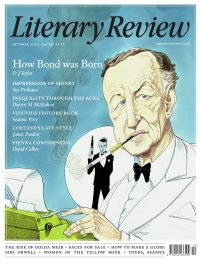Darrin M McMahon
Adam Smith the Socialist
Visions of Inequality: From the French Revolution to the End of the Cold War
By Branko Milanovic
Harvard University Press 368pp £28.95
For much of the 20th century, economists lost interest in history. That was particularly true of neoclassical economists in the West during the Cold War. Beguiled by the notion that theirs was an absolute science amenable to pure mathematical abstraction, they turned their backs on the record of experience. ‘Economics became the science of the present, slightly related to the future … but fully disconnected from the past’, Branko Milanovic writes.
Milanovic, by contrast, is deeply immersed in history. A pioneer of the study of global inequality who served for almost twenty years as lead economist in the research department of the World Bank, he has emerged over the last decade as a distinctive voice through his many books and blog posts, and occasional articles. Championing economists’ rediscovery of the past and historians’ interest in economics, he brings time back into the equation.
The book he has written here is about the history of economic thought. Like Robert Heilbroner’s 1953 classic The Worldly Philosophers: The Lives, Times, and Ideas of the Great Economic Thinkers, Milanovic’s book is organised around the lives and times of prominent figures. Yet his interest is more focused. Whereas Heilbroner set out to present a broad overview of the general theories of leading thinkers in the history of economic thought, Milanovic focuses specifically on how his figures envisioned income distribution. The result is a timely book that brings the weight of the past to bear on one of the most pressing issues of our time.
Just as economists forgot about history for much of the 20th century, they also forgot about inequality. That may seem surprising, given how centrally the subject has figured in recent commentary. But, as Milanovic shows, the ‘long eclipse of inequality studies’ was also a product of the Cold War. For

Sign Up to our newsletter
Receive free articles, highlights from the archive, news, details of prizes, and much more.@Lit_Review
Follow Literary Review on Twitter
Twitter Feed
The son of a notorious con man, John le Carré turned deception into an art form. Does his archive unmask the author or merely prove how well he learned to disappear?
John Phipps explores.
John Phipps - Approach & Seduction
John Phipps: Approach & Seduction - John le Carré: Tradecraft; Tradecraft: Writers on John le Carré by Federico Varese (ed)
literaryreview.co.uk
Few writers have been so eagerly mythologised as Katherine Mansfield. The short, brilliant life, the doomed love affairs, the sickly genius have together blurred the woman behind the work.
Sophie Oliver looks to Mansfield's stories for answers.
Sophie Oliver - Restless Soul
Sophie Oliver: Restless Soul - Katherine Mansfield: A Hidden Life by Gerri Kimber
literaryreview.co.uk
Literary Review is seeking an editorial intern.